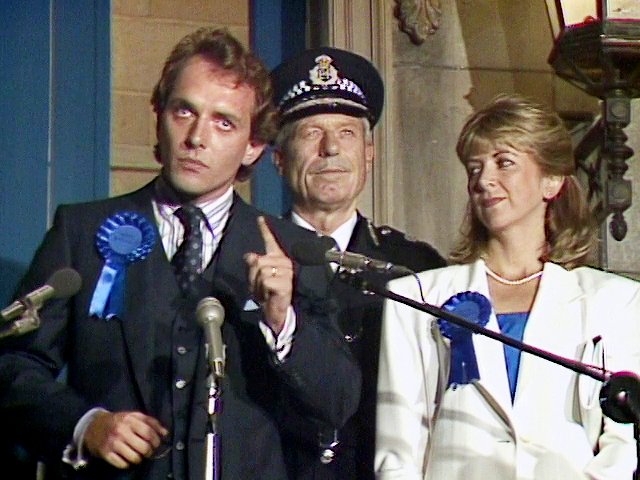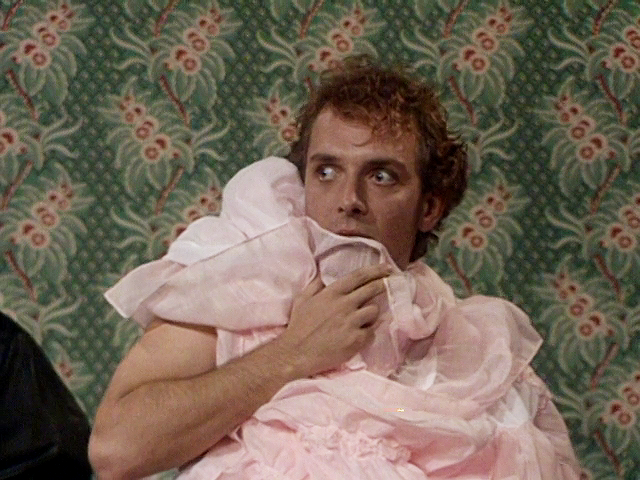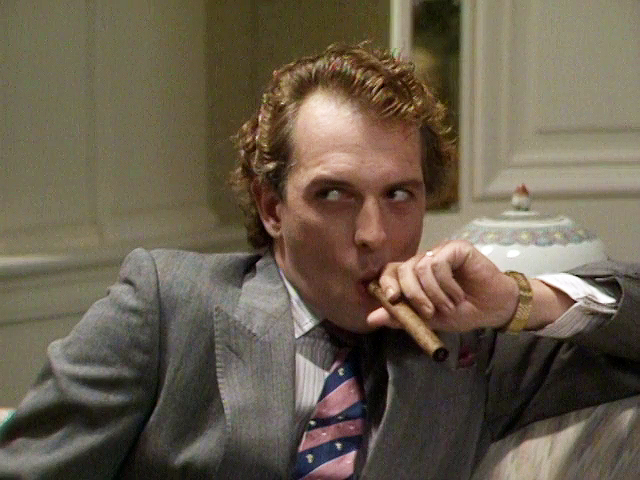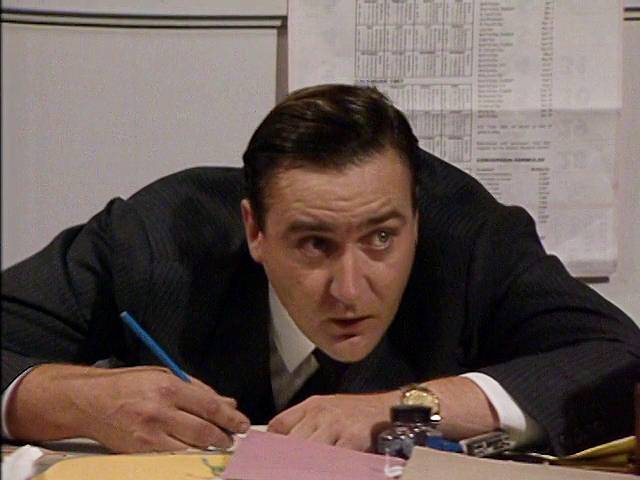
The recent 40th anniversary celebrations for the classic (and some might say unsurpassed) British comedy series Blackadder have come and gone without very much fanfare. As a lover of the show since my teens, I've been disappointed with the somewhat lukewarm response from the media to this significant birthday, and especially the complete lack of comment or even acknowledgement from the BBC, the series' birthplace. The airing of the previously never-before-seen pilot of The Black Adder on June 15th was done by Gold, who also aired a short retrospective documentary on the following night.
The crickets on this subject has reminded me yet again of the sad decline of the BBC, and of the decline in quality of television overall for the past decade or so. It's not surprising to me at all that Succession, the only series worth watching for the past five years, was created by Jesse Armstrong, the creator of Peep Show and a lead writer on The Thick of It. He seems to be the only competent writer left in the Anglosphere. How can this be? Where have all the good screenwriters gone, and why aren't the BBC heaping attention on its gems from decades past to make up for this dire lack of decent comedy?
It's prompted me to realise that countless shows have been buried in the distant past of the last 40 years, either by the natural passage of time, or deliberate idleness. I'm sufficiently paranoid to suspect that, in quite a few cases, their disappearance from mainstream culture and memory is a result of their "outdated" humour. Each generation is getting worse and worse at passing down their cultural treasures, and the media appear content to heap nothing but more and more dirt on shows that were lauded in their time.
On one hand, I don't necessarily expect to be seeing reruns of Blackadder regularly on BB2 (although if they replaced its current edition of QI with it, I think the few people who noticed the change would be rather pleased with it). On the other hand, the recent controversial cuttings and censorings of works such as The French Connection and Fawlty Towers, as well as the lack of response from the BBC to one of its best loved and popular franchises' anniversaries makes me increasingly worried that there are shows we will never see repeated on television ever again, even if they are flawed in some way. One of these shows is The New Statesman.
Blackadder's titular Machiavellian protagonist is my favourite character from the show, but I'm always tempted to say it's actually the larger-than-life sex bomb Flying Squadron Commander the Lord Flashheart from Blackadder Goes Forth. Stealer of scenes (and hearts), he was played to perfection by the inimitable Rik Mayall, who is best remembered for his turn as Richard "Richie" Richard in the anarchic situation comedy Bottom, along with his cameos in Blackadder and frequent collaborations with fellow alternative comedians Ade Edmondson, French and Saunders and Robbie Coltrane.
Unfortunately, for all fans of Blackadder and his other work, days like the 40th anniversary are tinged with sadness as they remind us that Mayall was taken from the world far too soon. June 9th, 2024 will mark 10 years since his untimely passing. But he lives on through his characters, whose personalities were always taken to the nth degree in almost every direction - whether they were hyperactive ladies' men, or repulsive, psychotic virgins. The slick and politically savvy MP with the "largest majority in the House of Commons" of The New Statesman, Alan B'Stard, is no exception.

The New Statesman could be in the dictionary under the phrase "product of its time". The first season kicked off in 1987 on ITV, banking on the talent of Mayall to draw its audience - and it did. And without him, it likely wouldn't have. I don't mean to seem unduly harsh, but the issues with the show only seem to get worse the longer the first season goes on. But first, I want to say a kind word or two about it. I'll try not to devote all of them to shamelessly perving over Rik Mayall.
First of all, the name of its central character never gets old. It's like "Darling" from Blackadder Goes Forth. It doesn't matter how many times you hear "bastard" and "it's B'Stard", Mayall's pronunciation will make you chuckle at the very least. It's a blunt tool compared to "Darling", but it gets the job done.
Mayall himself is on fine form as the slimy B'Stard (hee hee), who is willing to use any means necessary to improve his social standing and further his political career, including marrying the daughter of the leader of the Conservatives, taking out the election competition by engineering a car "accident", and routinely making and breaking alliances with anyone if he stands to benefit from them. As "The New Statesman", he is supposed to epitomize the excess and rabid right-winged-ness of the Thatcher-era Conservatives - which, looking at it from where we are now, doesn't seem as silly as it did in 1987. Well, maybe the Bentley driving and expensive wine-swilling is still cartoonishly funny (and rather sad).

Charles Grey, whom I fondly remember as the central villain of the Hammer Horror classic The Devil Rides Out appears as the aforementioned Conservative leader in the fourth episode of the first season. Seeing Alan turn on a dime and scramble to suck up to him once he realises he can get something he wants from the old man makes it an enjoyable cameo. Whenever Alan wants something, the faux friendliness he puts on reminds one of Bottom's Richie and his off-putting smiles. It's one of the few moments that will remind you that they are played by the same man.
Mayall, when asked about how people perceived the show, allegedly said the following: "In the first series people were saying 'Gosh, isn't Rik Mayall good-looking?' but by the second they were saying 'Gosh, isn't Rik Mayall a good actor?' and that's all I ever really wanted." A remark, I suspect, made only half in jest - for all his unpleasant qualities (and there are many), B'Stard is an always preened, very handsome MP (renowned in Westminster for his sense of humour, his enormous majority, and his incredible virility). If Tumblr had existed in the 80s, gifs and screenshots of B'Stard would have been plastered all over it, in the same way that various Succession stars are now by their rabid twenty-something fans with too much time on their hands (unlike me - I write!) It sounds like a ridiculous thing to say about the man who played Richie "and mine's tiny!" Richard, but Mayall is very attractive as the smarmy B'Stard, with his suave RP accent and prep school boyish features.


His attractiveness doesn't add much to the substance of the show, however (although it's kept me riveted for at least a season). It is, nominally-speaking, a satire of the Thatcher era, but it isn't particular biting or witty in the way that the vastly superior The Thick of It is. A joke per episode about Jeffrey Archer and a mad, literally holier-than-thou DCI who wandered into the first episode off the set of The Omen aren't what I consider raucous parody. Yes, it may be unfair to be drawing comparisons with The Thick of It, which was and remains the finest political comedy ever written, but I'm afraid it's an inevitability, given the subject matter. I'm not sure what the problem is - either the satire is too obvious, or it isn't strong enough. Either way, it comes off as lazy. There are also plot elements to the overarching narrative that aren't funny at all, and I'm bemused as to how exactly they were intended to get any laughs.
One of them is the fact that Alan's wife is secretly having an affair with his female press secretary. It's used to extract one feeble chuckle at the start of the third episode, when he complains to the secretary that his wife isn't interested in sex at all, and aside from that, it contributes very little else. Not even the studio audience knows what to do whenever she and Sarah B'Stard are together. Another is the gradual sex change that Alan's amoral accountant Norman undergoes across the first season. I can't tell if it would be considered an acceptable portrayal of the so-called "gender fluid" in today's cultural landscape or not, but that's rather beside the point. It's simply not very funny. It's just weird.
I have to gripe about Piers, as well. He's clearly inspired by such blundering second fiddles as Blackadder's Baldrick and Fawlty Towers's Manuel, but if they were a shot of tequila to make you giddy, Piers is a weak herbal tea. His reedy voice grates, his jokes are uninspired, and he only serves to make Alan look 100 times more competent than he actually is, which leads me to my final complaint about the show thus far - if Alan really is such a B'Stard, then why does he always seem to be winning?

The key to Blackadder's success, as has been noted by countless fans and people involved in the show, is that Blackadder is a smart man surrounded by fools, who strives endlessly to improve his lot in life and nearly always fails. His failures can be attributed to a combination of rotten luck, the incompetence of those around him, and his own incompetence, which, although it fails to keep him humble, encourages the audience to develop affection for him. He's a git, but he's our git. We want to see him succeed, even though he doesn't really deserve to. It's the cornerstone of almost every great television show of the past three decades - everything from The Sopranos to Better Call Saul. With a drama, it's okay for the anti-hero to win - as long as there's a decent amount of comedy and pathos mixed in to alleviate the viewer's guilt over wanting someone evil to triumph. In a comedy, it doesn't work. We want to laugh at them, not with them. And seeing B'Stard inexplicably pull one over a planeful of MPs headed to an investment scam that he's concocted doesn't generate much amusement or satisfaction (although the absurdity of the situation does have something inherently funny about it).
Rik Mayall's back must have been breaking from carrying this show through its first season. His performance is worth the watch, because in spite of the limitations of the script and its unexpected sympathy for him, it is possible to get attached to B'Stard. And it's solely because Mayall is playing him. If he and audience members are to be believed, the show improves to some degree in future seasons. I hope it does. Even though I sound as if I hate it, I have enjoyed it thus far, and if I'm critical, it's only because I see the potential it had to be much, much funnier. If only it could somehow ditch Piers...
June 26th, 2023